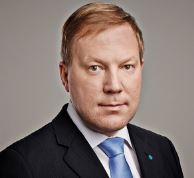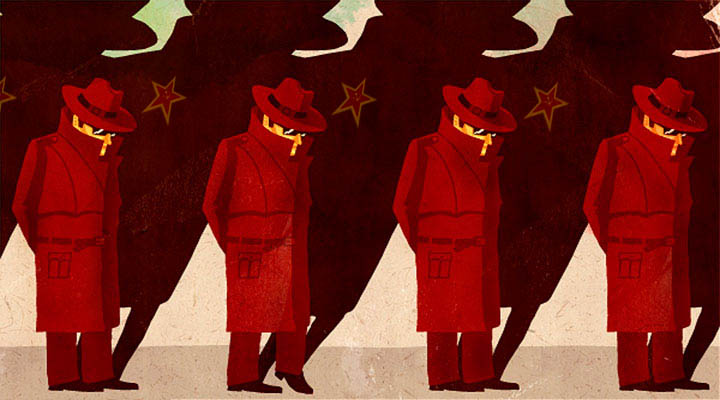In Western official discourse, NATO-Russia relations are often analyzed by wishful thinking rather than by accepting realities. It is natural that the defense alliance is vocal in making it clear – we are not threatening Russia and would like to have a trustful dialogue.
Moreover, dialogue as a tool is productive only as long as both sides care about it. Russia does not. Their long term strategy is to undermine NATO’s unity. We have to understand that the only possible way to achieve a dialogue with Russia is through credible deterrence. NATO Warsaw Summit was a solid step in the right direction.
In order to understand the seriousness of the long-term challenge posed by Putin’s Russia to NATO, we have to look into Russia’s history. It quickly becomes clear that Putin’s leadership is nothing more than just a continuation of Russian traditional way of perceiving the world.
To be an empire is Russia’s DNA. Russian philosopher Ivan Ilyin predicted the failure of the Communist project nearly half a century in advance, and stressed that
“with each attempt to divide Russia and after each disintegration it restores itself again by the mysterious ancient power of its spiritual identity.”
It is in no way surprising that, immediately after the disintegration of the Soviet Union and the passing of the first shock, Moscow began consistent activities toward restoring the lost influence. To a skilled eye, it was clear already in the beginning of the 1990s that Russia is attempting to draw a clear borderline between its primary sphere of influence and the rest of the world through the “near-abroad” policy. The near-abroad essentially equaled to the territories of the lost empire.To be an empire is Russia’s DNA.
Already in 1992, a shocking warning from Moscow hit many Western diplomats. On 14 December 1992, the annual meeting of Foreign Ministers of the CSCE took place in Stockholm. The then 41-year-old Foreign Minister Andrey Kozyrev was by nature the counterpart of a through and through Western-minded Russian diplomat or politician. President Yeltsin had appointed him as the Russian Foreign Minister already in October 1990 when the Soviet Union with its giant diplomatic machinery was still in place.
Kozyrev was one of the first speakers in Stockholm. He asked for the attention of those present, because he had been entrusted to deliver an important message from Moscow. “I have the duty to present the changes in the main line of Russia’s foreign policy,” Kozyrev began, and brought out three major issues.
- First, Kozyrev stressed that Russia would continue the Europe-oriented policy, but its traditions lied in Asia, and that set limits to approaching Western Europe. Kozyrev admonished NATO because the Alliance was strengthening its military presence in the Baltic countries and in other territories of the former Soviet Union. Kozyrev also warned the West not to use too much power against Serbia.
- Second, Kozyrev informed everybody that not all CSCE norms applied in the territory of the former Soviet Union. “Actually, it is the territory of a former empire where Russia must defend its interests, using all means, including military and economic, for that,” Kozyrev frightened the listeners with his straightforwardness and went on to say that the republics of the former Soviet Union should immediately form a federation or confederation.
- Third, Kozyrev wagged his finger at all those who doubt Russia’s ability to stand for its own and its friends’ interests. “We are of course ready to play a constructive part in the work of the CSCE Council but we are very cautious with regard to ideas that will lead to interference with our internal affairs,” Kozyrev concluded, and the hall fell dead silent.
Only after a brief while did it become clear that Kozyrev meant none of it seriously. It was a diplomatic electric shock for those present, a reference to a possible development in Russia if the Western-minded forces should fall from power.

Kozyrev’s words proved more than prophetic. Before too long, Russia began to move step by step towards changing the foreign policy course that Kozyrev had warned his colleagues about in Stockholm. Kozyrev held his office until 1996, when Yevgeny Primakov, who had belonged to the Soviet top nomenclature and led the foreign intelligence service in the beginning of the 1990s, was appointed to replace him.
It was Primakov who laid the foundation for the change in the foreign policy line of Russia in roughly the same key that Kozyrev had warned about only a few years earlier. Opposition to the hegemony of the United States and strengthening of Russia’s positions in the emerging multipolar world became Primakov’s leading idea.
Domestic economic difficulties and the war in Chechnya did not allow Russia to set up a major confrontation with the expansion of the influence of the West on the eastern edge of Europe, including in the territories of the former Russian empire. Russia made repeated attempts to stop the expansion of NATO, but with no success. At the US-Russia summit in Helsinki in March 1997, for example, President Yeltsin made a proposal that, instead of NATO’s expansion to the Baltic States, Russia could ensure their security. President Clinton quickly rejected the proposal to divide the spheres of influence, and already a few months later the founding treaty of Russia-NATO relations was concluded.
It can be said that this time, the spring and summer of 1997, was the culmination of a brighter time in the relations between Russia and NATO. It was accompanied by a hope that the end of the war with many victims in Chechnya, and bringing reform-minded politicians such as Boris Nemtsov to the Government, indicated President Yeltsin’s desire to give the country a new impetus towards democratic and market economy developments. Yet the hopeful time remained very short.
Everything changed on 24 March 1999. Yevgeny Primakov, who had become Prime Minister in the previous year, was on his way to an official visit to Washington when he got the news that NATO countries had begun air strikes against Yugoslavian targets. Above the Atlantic, Primakov made the decision to cancel the visit and turn back the plane.
This symbolic U-turn came to mark the end of the hopeful period that had been going on in Russia-West relations. Barely a few months later the whole world learned the name of Yeltsin’s successor. The former KGB officer Vladimir Putin embraced the methods of his home organization as well as Primakov’s doctrine. After having attained control of internal affairs, Putin steered Russia to the course of expansion and an aggressive foreign policy. Rising from the knees had begun. The Russian President described his intentions most expressively at the Munich security conference in February 2007.
At present, Russia’s attitudes or activities are in no way different from what Kozyrev warned against 25 years ago.
There is no point in creating an illusion that a fundamental change of course would take place in Russia in any foreseeable future.
President Putin has stressed that the funeral of Russia (read: the Russian civilization) cannot be a precondition for bringing down the geopolitical tensions. Therefore NATO allies have to focus on how to ensure a modus vivendi with its eastern neighbor who lays stress on its civilisational particularity.
In order to achieve this strategic aim, it is extraordinarily important to maintain the unity of the West and to stand for the values founded on the freedom of the individual. The NATO Summit in Warsaw in July 2016 was exactly what the Alliance needed. There was a strong common line both in the perception of threats and in deciding on deterrence measures.
This is nothing new for the Western alliance. Keir Giles from Chatham House told to NATO Parliamentary Assembly in 2015 that his organization published in 1953 a retrospective of recent history. Its review of relations between the US, the UK and the Soviet Union focused on how everything had gone so appallingly wrong after the Second World War, resulting in the loss of Eastern Europe to Soviet domination.
One of its key conclusions, when reviewing what was effective in dealing with Moscow and what was not, was that any initiative by the Western Allies which “was not backed up by significant military force, merely irritated the Russians without impressing them.” That was true in Imperial Russian times, it was true throughout the Soviet period, and it is true today.
That was true in Imperial Russian times, it was true throughout the Soviet period, and it is true today.
In 2011 the Conflict Studies Research Centre in the UK published a report called “The State of the NATO-Russia Reset.” This report described the temporary optimism in NATO-Russia relations that followed the Lisbon summit in November 2010 as just the latest high point in a familiar and predictable cycle that had already repeated itself several times since 1991. No matter how many times the relationship was reset or re-established, the report said, inevitably it soon foundered on the basic conflict of fundamental strategic objectives between the Alliance and Russia. The report looked ahead to the next round of confrontation with Russia, which it predicted would arrive shortly. And here we are today.
Understanding and accepting that this basic conflict of interest between Russia and NATO means we must invest heavily and for the long term in deterring Russia in ways which are meaningful to Moscow. It is the biggest contribution we can make now to future European peace and stability.

Read also:
- Ukraine now more supportive of NATO than Visegrad EU countries
- Ukraine restores course towards NATO membership
- How Ukraine can open its door to NATO
- Ukraine and NATO
- What can Ukraine offer NATO?
- That time when the Soviet Union tried to join NATO in 1954
- Kyiv commentator: Seven signs NATO has 'finally come out of its coma





